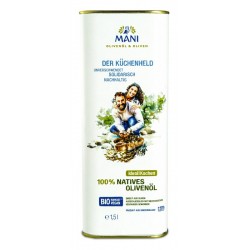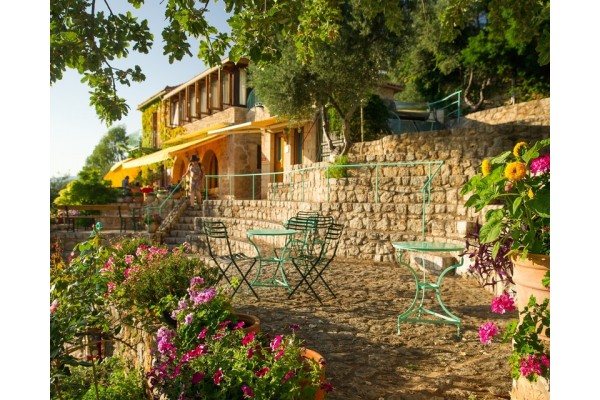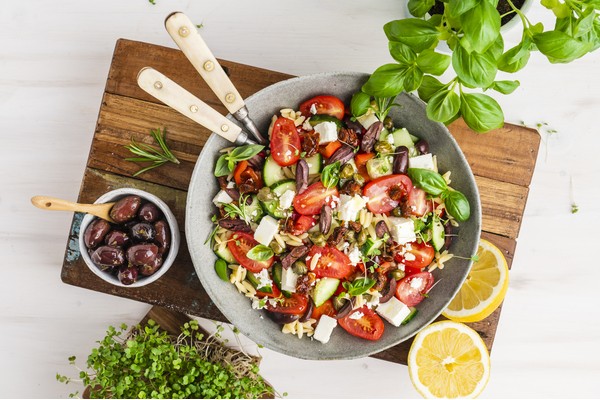Virgin olive oil – the all-rounder in the kitchen. And not just in Greek or Italian. All of Europe now has olive oil in the pan. But what does the addition “virgin” actually stand for? Virgin literally translates to „natural”. Olive oil is virgin when it is obtained directly from olives using only mechanical processes. It does not come into contact with chemical solvents. This makes virgin olive oil a tasty and, above all, healthy kitchen hero.
What is „virgin olive oil“ in other european languages?
- German: natives Olivenöl
- French: huile d'olive vierge
- Spanish: aceite de oliva virgen
- Italian: Olio vergine di oliva
- Greek: παρθένο ελαιόλαδο

Kitchen Hero: 100 % virgin olive oil from MANI
Classification of olive oil
Olive oil is not always simply olive oil – after all, not every olive is the same. From cultivation to the degree of ripeness to the manufacturing process, there are decisive differences that have an impact on the end product and thus also on the taste. There are a total of eight different quality classes defined by European Regulation (EC) No. 1234/2007 (updated 61/2011):
- Class 1: extra-virgin olive oil
- Class 2: virgin olive oil
- Class 3: virgin lampante olive oil
- Class 4: refined olive oil
- Class 5: "olive oil" (composed of refined olive oil and virgin olive oils)
- Class 6: olive pomace oil
- Class 7: crude olive-pomace oil
- Class 8: refined olive pomace oil
Not all quality classes are approved for consumption and available in the food trade. Virgin olive oil and extra virgin olive oil are mainly found on the shelves of Central European supermarkets. The lower quality grades are found only in manufacturing countries.
Olive Oil Connoisseur Fact: The term olive oil can be misleading as it has two distinct meanings. On the one hand, olive oil is the collective term for all oils produced from olives, and at the same time one of the quality classes is explicitly named olive oil. Ironically, Grade 5 is not made directly from olives, but is obtained through a chemical process that makes lampante oil edible.
Difference between extra virgin olive oil and virgin olive oil
In contrast to non-virgin olive oils, grades 1 and 2 are purely natural. Both virgin and extra virgin olive oil are obtained directly from olives and free of chemical processes. This means that the oil is only extracted from the fruit by mechanical or other physical methods. So by squeezing, pressing or squeezing - gently at low temperatures.
Both types of olive oil are approved for consumption and are suitable for use in the kitchen. Extra virgin olive oil is the front runner – the haute cuisine so to speak – in the world of olive oils. The main difference from grade 2, virgin olive oil, is the acidity. Extra virgin olive oil must contain no more than 0.8% free fatty acids, while virgin olive oil contains up to 2% free fatty acids.
In addition, only the finest fruit is used for extra virgin olive oil, whereas the olives used for “virgin” may have minor damage. For example, many olive growers have struggled with olive fruit fly infestations for years. This does not have a major impact on the taste, however. The most dedicated food lover may notice the difference, but for normal use in the kitchen both olive oils are excellent. In terms of health aspects, extra virgin and virgin olive oil are very similar. Both edible oils convince with a high proportion of monounsaturated and polyunsaturated fatty acids as well as vitamin E.

(Extra) virgin olive oil is obtained directly from the olive fruit.
Use of (extra) virgin olive oil in the kitchen
What is extra virgin and virgin olive oil used for in the kitchen? There are many questions, myths and prejudices surrounding this topic. How high can olive oil be heated and is virgin olive oil even suitable for frying? The answer is: Of course, yes! Both extra virgin and virgin olive oil have a high proportion of monounsaturated fatty acids and many plant-based antioxidants. This makes the natural oil product from olives heat-resistant up to at least 180 °C. Ideal for gently searing in a pot or pan. In Greece, virgin olive oil is often used for cooking and baking.
Ready for a gentle touch of Mediterranean delights in your own four walls? MANI recipe tip: Homemade Plucked bread with dried tomatoes and olives transports not only olive fans to distant worlds.
Of course, some nutrients are lost during heating. For this reason, it makes sense to switch to a virgin olive oil and use the high-quality extra virgin olive oil for salads and other cold dishes. Especially in combination with vegetables and salad, where fine differences in taste and quality become clear and extra virgin olive oils become a real treat.
By the way: (extra) virgin olive oil has also been proving its qualities outside of the kitchen for centuries. As a traditional household remedy, it unfolds its anti-inflammatory effect or gives shine in its function as a natural skin and hair treatment.
Conclusion
In virgin olive oil, in contrast to “extra virgin olive oil”, also slightly damaged fruits are used. This does not make virgin olive oil a second-class product, but rather a tasteful sign of sustainability.
„We have been working in close cooperation with the olive farmers for 40 years, so it is a logical step for us to also buy the imperfect natural product from them, i.e. the olive oil that is not extra virgin oil.” (Original quote, Felix Bläuel)
The heart of MANI beats for solidarity as well as for ecological and economic sustainability. The 100% virgin olive oil counteracts food waste and brings healthy versatility to any kitchen!

















